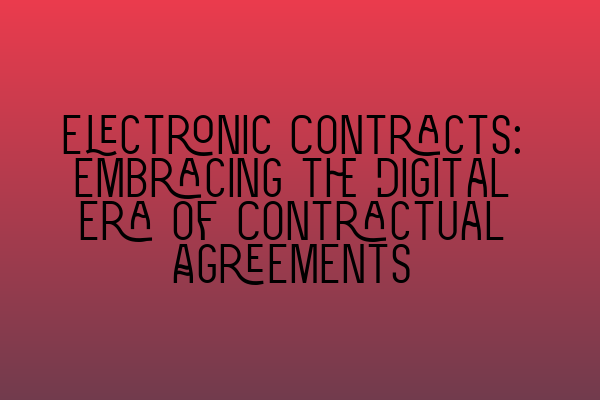Electronic Contracts: Embracing the Digital Era of Contractual Agreements
In today’s fast-paced world, technology has become an integral part of our lives. It has impacted various industries, and the legal field is no exception. With the rise of digitalization, traditional paper-based contracts are slowly being replaced by electronic contracts. In this blog post, we will explore the concept of electronic contracts, their advantages, and the legal considerations surrounding them.
What are Electronic Contracts?
Electronic contracts, also known as e-contracts or digital contracts, are agreements created and signed electronically without the need for physical paperwork. These contracts can be formed, negotiated, signed, and fulfilled entirely in electronic form.
Companies and individuals are increasingly opting for electronic contracts due to their convenience, efficiency, and cost-effectiveness. Instead of sending multiple copies of paper contracts through mail, parties can simply exchange electronic copies through email or other secure platforms.
Advantages of Electronic Contracts
Electronic contracts offer numerous benefits to businesses and individuals alike. Let’s explore some of the key advantages:
1. Convenience and Efficiency:
Electronic contracts eliminate the need for physical meetings and paperwork. Parties can review, negotiate, and sign contracts from anywhere in the world, saving time and resources. Additionally, electronic contracts can be stored and accessed easily, eliminating the hassle of searching through stacks of paper documents.
2. Cost-Effectiveness:
By going digital, businesses can significantly reduce costs associated with printing, copying, and postage. Electronic contracts also eliminate the need for physical storage space and minimize the risk of document loss or damage.
3. Faster Negotiation and Execution:
Electronic contracts can be created and signed within minutes, streamlining the negotiation and execution process. Parties can collaborate in real-time, make changes effortlessly, and finalize contracts more quickly.
4. Enhanced Security:
Contrary to popular belief, electronic contracts can offer higher security than traditional paper contracts. Encryption technologies, access controls, and secure digital platforms ensure that contracts are protected from unauthorized access and manipulation.
Legal Considerations for Electronic Contracts
While electronic contracts provide numerous advantages, it is crucial to be aware of the legal considerations surrounding them. Here are a few key factors to keep in mind:
1. Validity and Enforceability:
In most jurisdictions, electronic contracts are deemed legally valid and enforceable if they meet certain requirements. These requirements typically include the consent of the parties, an intention to create legal relations, and a reliable method of identification.
If you are unsure about the legal requirements for electronic contracts in your jurisdiction, it is advisable to consult with a qualified legal professional. They can guide you through the specific laws and regulations applicable to your situation.
2. Electronic Signatures:
To execute electronic contracts, parties often use electronic signatures. Electronic signatures can take various forms, such as scanned handwritten signatures, digital signatures, or even consent checkboxes on a web form.
It is important to ensure that the electronic signature used complies with the applicable legal framework. Understanding the specific requirements for electronic signatures in your jurisdiction will help you avoid any issues regarding enforceability.
3. Record Keeping and Retention:
When it comes to electronic contracts, maintaining proper records and document retention is essential. Parties should store electronic contracts in a secure manner and keep records of any changes or amendments made during the negotiation process.
Conclusion
Electronic contracts offer a new era of convenience and efficiency in the world of contractual agreements. They provide numerous advantages, including convenience, cost-effectiveness, faster execution, and enhanced security. However, it is crucial to consider the legal aspects of electronic contracts, such as validity, enforceability, electronic signatures, and record keeping.
With the increasing adoption of electronic contracts, it is essential for legal professionals to stay updated with the latest developments in this field. If you are preparing for the SQE exams, we recommend checking out our related articles:
- SQE 1 Practice Exam Questions
- SQE 1 Practice Mocks FLK1 FLK2
- SQE 2 Preparation Courses
- SQE 1 Preparation Courses
- SRA SQE Exam Dates
Stay informed about the changing landscape of contract law and make the most of the digital era by embracing electronic contracts.
